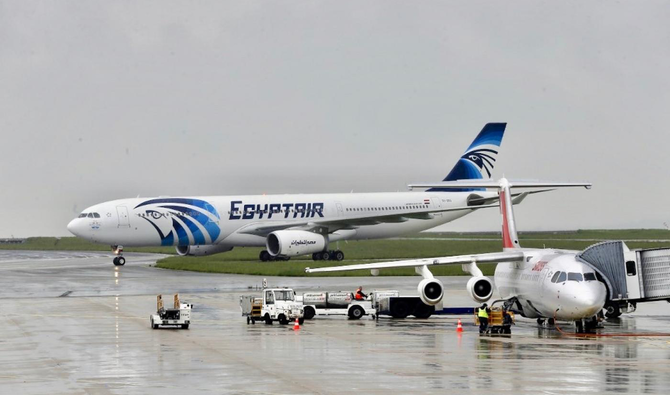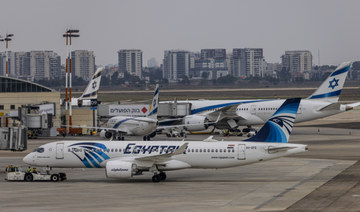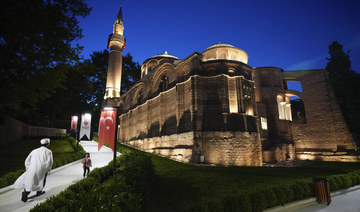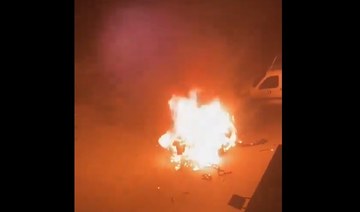CAIRO: Egyptair turned flight MS 729 bound for Moscow back to Cairo after a threatening letter was found on one of the seats of the aircraft, Egypt’s national carrier said on Wednesday.
“The flight landed 22 minutes after takeoff and passengers returned safely to the grounds of Cairo Airport where the necessary measures are being taken,” the statement said.
Moscow-bound Egyptair flight turned back after threatening letter found
https://arab.news/nvnsu
Moscow-bound Egyptair flight turned back after threatening letter found

10 years on, thousands forgotten in Syria desert camp

BEIRUT: In a no-man’s land on Syria’s border with Iraq and Jordan, thousands are stranded in an isolated camp, unable to return home after fleeing the regime and militants years ago.
When police defector Khaled arrived at Rukban, he had hoped to be back home within weeks — but eight years on, he is still stuck in the remote desert camp, sealed off from the rest of the country.
Damascus rarely lets aid in and neighboring countries have closed their borders to the area, which is protected from Syrian forces by a nearby US-led coalition base’s de-confliction zone.
“We are trapped between three countries,” said Khaled, 50, who only gave his first name due to security concerns.
“We can’t leave for (other areas of) Syria because we are wanted by the regime, and we can’t flee to Jordan or Iraq” because the borders are sealed, he added.
The camp was established in 2014, at the height of Syria’s ongoing war, as desperate people fled Daesh and regime bombardment in hopes of crossing into Jordan.
At its peak, it housed more than 100,000 people, but numbers have dwindled, especially after Jordan largely sealed its side of the border in 2016.
Many people have since returned to regime-held areas to escape hunger, poverty and a lack of medical care. The UN has also facilitated voluntary returns with the help of the Syrian Arab Red Crescent.
The last UN humanitarian convoy reached the camp in 2019, and the body described conditions there as “desperate” at the time.
Today, only about 8,000 residents remain, living in mud-brick houses, with food and basic supplies smuggled in at high prices.
Residents say even those meager supplies risk running dry as regime checkpoints blocked smuggling routes to the camp about a month ago.
Egyptian churches begin preparations to celebrate anniversary of Holy Family’s journey

CAIRO: Egypt’s Coptic community is preparing to celebrate the Feast of the Entry of the Holy Family into Egypt, starting on June 1.
Churches in the country have begun early preparations to welcome visitors, focusing on securing and preparing the sites along the journey the Holy Family is believed to have taken.
Robier El-Fares, an Egyptian Coptic researcher for Arab News, said: “The celebration of the journey of the Holy Family is a relatively new tradition that benefits religious tourism in Egypt. This comes after many years of neglecting the celebration.”
He added: “The route includes about 20 locations that represent the journey from Bethlehem in Palestine, fleeing the persecution of Herod who intended to kill Jesus Christ, and their subsequent travel to Egypt through plateaus and deserts.”
Father Augustinos Morris, priest of the Holy Family Church in Zeitoun, Cairo, for the Coptic Catholics, told Arab News: “Masses will be held at nine in the morning and six in the evening for all Copts who wish to participate. The readings are from Matthew 2, which discusses the flight into Egypt, and include a passage from the Old Testament in the Bible, amid the procedures followed in the holiday masses organised by the scout team.”
Father Matta Philip, priest of St. Mary’s Church in Maadi, Cairo, said: “The church is considered the first point of the Holy Family’s journey to Upper Egypt through a staircase, from there to a boat and then to Upper Egypt.”
He said: “Inside the Church of the Virgin Mary in Maadi, there is an icon depicting the life of the Virgin Mary, the altar vessels, and the Bible open to the verse — ‘Blessed be my people Egypt,’ — and a map of the family's route that starts from Arish and extends to the Monastery of Al-Muharraq.”
“Inside the church is the historic staircase that the Holy Family crossed, with an altar at its beginning where prayers are held,” he said. “From this staircase, the family headed to areas like Al-Bahnasa and Mount Al-Tair and other routes to the Monastery of Al-Muharraq, a journey that took about six months.”
Robier El-Fares said: “The known points of the Holy Family’s journey are 20, starting from Farma, located between the cities of Arish and Port Said, then to Tel Basta.”
“In Cairo, there are many points through which the Holy Family passed, including the area of Ain Shams, in addition to other areas in Maadi and Zeitoun, to start the points of Upper Egypt (southern Egypt), which are numerous including Gabal Al-Tair in Minya, and the Monastery of the Virgin Mary,” he said.
Supporters of Hezbollah and Amal protest in Beirut against security plan

- Security Forces warn against attacks on their units and members
- MP fears concerted campaign against interior minister
BEIRUT: Motorcycle owners in Beirut and the southern suburbs have protested against a security plan launched by the Ministry of Interior in the capital since Monday.
The protests reached their peak with gunfire being exchanged between the protesters and the internal security forces in the heart of the southern suburbs of Beirut.
The situation worsened on Sunday as protesters marched to the Ministry of Interior, claiming that the decision to confiscate unregistered motorcycles was being made randomly and arbitrarily while the vehicle registration office had been closed for years.
Thousands of young men and women have turned to using motorcycles as an alternative to cars since 2019 amid Lebanon’s economic crisis.
The shift has led to a rise in motorcycle thieves targeting people at the entrances of Beirut, particularly on the airport road and highways to the suburbs.
A Lebanese security source said that thieves often seek refuge in Palestinian refugee camps at the entrances of Beirut or in slums in the southern suburbs of Beirut, where illegal weapons are prevalent.
Social media activists shared videos of security forces confiscating motorcycles, while owners claimed the registration service was inaccessible, leading to a lack of registration.
For more than four years, tens of thousands of transactions have accumulated in the vehicle registration department without market licenses, car books, electronic stickers or license plates being issued.
This is due to the crisis of fluctuating exchange rates between the government and contractors — especially contracts in dollars.
In addition to this crisis, corruption investigations are being conducted.
The southern suburbs of Beirut, a stronghold for Hezbollah and the Amal Movement supporters, saw clashes between protesters and security forces on Saturday night.
The supporters held motorcycle rallies to oppose the security plan.
Protesters gathered around the Al-Marija Police Station to chant the message to Interior Minister Bassam Mawlawi that the situation was not under his control.
The Internal Security Forces said that the protesters fired in the air, and the police officers fired in the air to remove them from the site. There was no deaths or injuries among the protesters or the police, as claimed by some social media sites, according to authorities.
The security plan started on May 15, following a meeting of security service leaders 10 days before.
The meeting focused on Beirut’s security due to the increase in pickpocketing, theft, weapon threats and drug trafficking using motorcycles.
The security plan is based on strict measures aimed at maintaining security.
Traffic police units in Beirut and the southern suburbs conduct patrols day and night, with support from various units of the Internal Security Forces, such as the Fuhud forces, the judicial police and others.
Protesters have been blocking main roads with burning tires during afternoon rush hours for days.
Some affected roads include Sports City Road, Mazraa Corniche and the Mar Mikhael-Chiyah intersection.
A political observer expressed concern that “the protest in the heart of the southern suburb of Beirut against one of the state’s police stations may have been carried out with direct cover from Hezbollah, which rejects any disturbance to this environment. Hezbollah maintains a stable security grip in the southern suburb of Beirut while focusing on its war on the southern front against the Israeli army.”
One of the most prominent objections was a statement by the mayor of Ghobeiry, Maan Al-Khalil, who is close to Hezbollah.
The mayor protested against “the confiscation of motorcycles and vehicles belonging to the municipality and driven by municipal employees.”
Beirut MP Nabil Badr said that there was a campaign targeting the interior minister, who is committed to safeguarding the Lebanese people’s safety.
The MP said: “From the start of the security operation, we have urged a comprehensive effort in government agencies, particularly the Car and Motorcycle Registration Department, to help citizens resolve their breaches. The minister has acknowledged the issues and assured that the strict measures will be eased.”
Badr fears that “the campaign aims to create complete chaos in the streets of the capital and its suburbs among those affected by the imposition of security and state prestige. This is something we categorically reject.”
In a statement released on Sunday, the Internal Security Forces rejected “any attacks on their units and members, regardless of the excuses.”
They said that the security plan was requested to protect citizens on public roads from theft, robbery and reckless motorcycle riders, as well as their failure to wear helmets, which has led to an increase in traffic accident deaths.
The security plan aimed to protect people, they said, not to seek revenge or retaliate against them, and, according to authorities, has resulted in a significant decrease in crimes.
Hundreds rally in support of Tunisia president

- ‘No to foreign interference, because we are a sovereign state,’ say protesters
TUNIS: Hundreds of people rallied Sunday in downtown Tunis in support of President Kais Saied.
President Saied on Thursday blasted the international criticism as foreign “interference” and ordered the Tunisian Foreign Ministry to summon the ambassadors of several countries.
“No to foreign interference, because we are a sovereign state,” said Saber Rzigue, a protester on Sunday.
“We support the Tunisian leadership, particularly President Kais Saied.”
“We are against foreign interference and against traitors, even if they are Tunisian,” said Mohamed Hentati, another protester.
“Today, we want to contribute to history and stand against anyone who wants to occupy our country and try to change its social fabric,” he added.
Sunday’s rally also came after a protest and strike by lawyers earlier in the week over police raids and arrests in the national bar association.
But Saied replied on Thursday by saying the arresting of two lawyers was “in full respect for Tunisian law, which guarantees equality and the right to a fair trial.”
Demonstrators on Sunday defended the president. “Kais Saied is above all of us,” said Mahmoud, a protester who chose not to give his full name.
“It is in him that we trust. He brought us security and peace.”
Separately, Tunisia recovered the bodies of four migrants off the country’s coast, the national guard said, amid an increase in migrant boats heading from Tunisia toward Italy in recent weeks.
The force said the coast guard separately rescued 52 migrants. The national guard arrested nine smugglers, and boats were seized.
At least 23 Tunisian migrants were missing after setting off in a boat for Italy, the national guard said.
Tunisia is facing a migration crisis and has replaced Libya as the main departure point for people fleeing poverty and conflict in Africa and the Middle East in the hope of a better life in Europe.
UN aid chief warns of ‘apocalyptic’ consequences of Gaza shortages

- Famine is “looming,” UN’s humanitarian chief Martin Griffiths said
DOHA: The stranglehold on aid reaching Gaza threatens an “apocalyptic” outcome, the UN’s humanitarian chief Martin Griffiths said on Sunday as he warned of famine in the besieged territory.
“If fuel runs out, aid doesn’t get to the people where they need it, that famine, which we have talked about for so long, and which is looming, will not be looming anymore. It will be present,” Griffiths said.
“And I think our worry, as citizens of the international community, is that the consequence is going to be really, really hard. Hard, difficult, and apocalyptic,” he told AFP on the sidelines of meetings with Qatari officials in Doha.
An Israeli incursion into the southern Gaza city of Rafah, launched in the face of international outcry, has deepened an already perilous humanitarian crisis in the Gaza Strip.
Griffith, the UN’s Under-Secretary-General for Humanitarian Affairs and Emergency Relief Coordinator, said some 50 trucks of aid per day could reach the hardest-hit north of Gaza through the reopened Erez crossing.
But battles near the Rafah and Kerem Shalom crossings in Gaza’s south meant the vital routes were “effectively blocked,” he explained.
“So aid getting in through land routes to the south and for Rafah, and the people dislodged by Rafah is almost nil,” Griffiths added.
The UN said on Saturday that 800,000 people had been “forced to flee” Israel’s assault on Hamas militants in Rafah.
With fuel, food and medicine running out, Griffiths said the military action in the southern Gazan city was “exactly what we feared it would be.”
“And we all said that very clearly, that a Rafah operation is a disaster in humanitarian terms, a disaster for the people already displaced to Rafah. This is now their fourth or fifth displacement,” he said.
With key land crossings closed, some relief supplies began flowing in this week via a temporary, floating pier constructed by the United States.
Griffiths said the maritime operation was “beginning to bring in some truck loads of aid” but he cautioned “it’s not a replacement for the land routes.”
The war began after Hamas’s unprecedented October 7 attack on Israel, which resulted in the deaths of more than 1,170 people, mostly civilians, according to an AFP tally based on Israeli official figures.
Israel’s retaliatory offensive against Hamas has killed at least 35,386 people in Gaza, mostly civilians, according to data provided by the Hamas-run territory’s health ministry.
Out of 252 people taken hostage from Israel during the October 7 attack, 124 remain held in Gaza including 37 the army says are dead.
On Thursday, the Arab League called for a UN peacekeeping force to be deployed in the Palestinian territories and for an international conference to resolve the Palestinian issue on the basis of the two-state solution.
Griffiths said the statement from the 22-member bloc in Manama was “very important because it focused on the future.”
He explained there were a “number of different conferences being mooted and potentially planned” to discuss humanitarian arrangements in Gaza, including in Jordan.
“I feel very strongly and I know that the Secretary-General feels very strongly that the United Nations needs to be present at the table when all these things are being discussed,” the UN aid chief said.
But he cautioned on the likelihood of a UN peacekeeping force for the Palestinian territories. A proposed deployment could be blocked by a veto from permanent Security Council members, while it would also require the acceptance from the warring parties of the UN’s presence.
The UN announced in March that Griffiths, a British barrister, would step down in June over health concerns.
He said that in recent years he had observed that “the norms that were built up very painfully, indeed since the founding of the United Nations... but particularly in the last couple of decades, seem to have been set aside.”
“There is no consensus on methods of dialogue and negotiation, or mediation, which need to be, in my view, prioritized. And so we have an angry world,” Griffiths said.



















